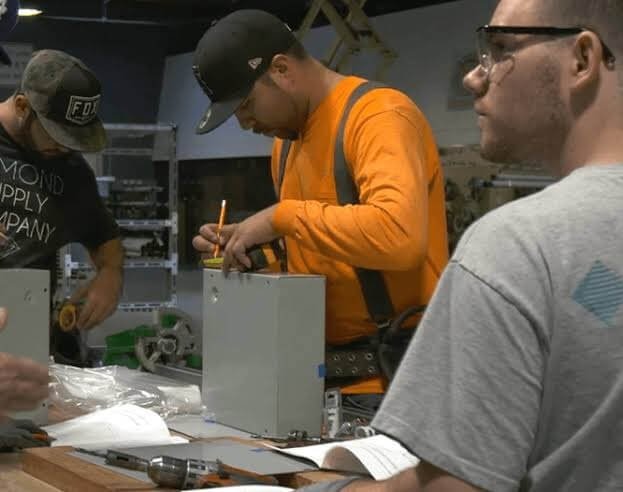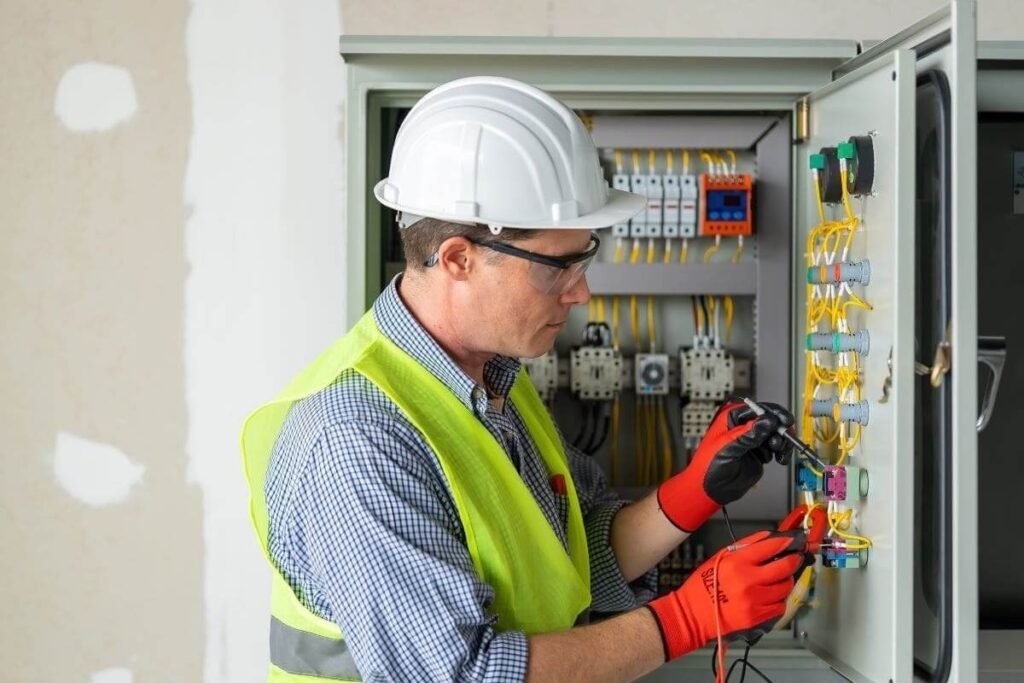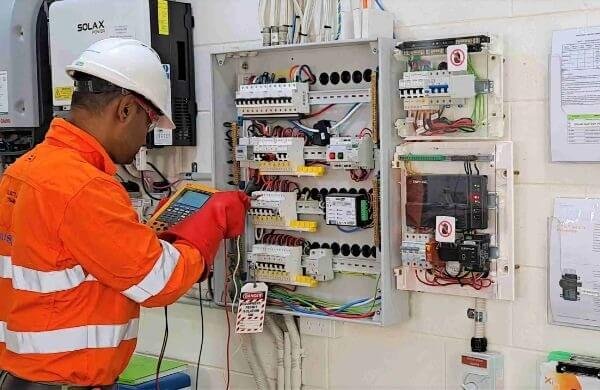Factories run on a tight schedule where even a few minutes of unplanned downtime can lead to significant losses, safety challenges, and strained client relationships. In this scenario, the choice of hiring a certified electrical contractor is more than just a contractor choice — it is an investment decision in maintaining business operations, compliance with safety regulations, and safeguarding the asset for future risks.
The level of specialization required for today’s industrial electrical systems goes way beyond basic electrical skills. Parts of industrial processes such as power distribution networks, motor control centers, automation systems, and even the safety instrumentation systems need specialized knowledge of the industrial processes and related ecology, plus the interdependencies of the electrical systems and production machinery. Only contractors with a proven track record of mandatory certification can navigate these systems safely and efficiently.
In addition, industrial electrical systems carry risks which can lead to catastrophic consequences if not properly managed. Arc flash, equipment damage, and violating regulations can lead to loss of life, equipment worth millions, hefty fines, and a standstill in production. Understanding the context of industrial certification allows facility managers, plant engineers, and operations directors to make smarter decisions that shield their investments and their personnel.

The Technical Complexity That Demands Certified Expertise
Industrial electrical systems are far more advanced than commercial ones. For example, they use high-voltage distribution systems that operate at 4,160V, 13,800V, and even higher. These systems need a specialist who understands insulation coordination, protective relay schemes, and arc flash hazard analysis. Such systems need contractors that not only know how to install equipment but know how to and design protection schemes that ensure minimal risk, optimal reliability, and risk mitigation during fault conditions.
Industrial motor control applications add more advanced layers. Additionally, they need to cater to the operational needs of the industry. For example, variable frequency drives, soft starters, and intelligent motor control centers not only need to be configured to the electrical characteristics of the equipment but also to the industrial processes. Certified electrical contractors comprehensively understand the impacts of motor starting techniques on mechanical equipment and electrical systems, and ensure optimized, balanced electrical and mechanical performance.
Power quality considerations such as harmonic distortion, voltage sags, and transient voltages are critical within industrial environments with sensitive electronic equipment and heavy motor loads. Such disruptions can lead to equipment damage and production downtimes, and to safety risks. Certified contractors are equipped with diagnostic evaluation procedures and the necessary analytical expertise to implement suitable countermeasures for a power quality problem.
Automation and Control System Integration
Contractors specializing in industrial automation systems are in high demand, as modern industrial facilities require a more advanced automation system that integrates seamlessly with the control, power, and instrumentation systems. Such systems require professionals who understand electrical installation, as well as network protocols, cybersecurity, and automated process requirements.
The reliable operation of the programmable logic controllers, human-machine interfaces, and distributed control systems depends on proper grounding, powering, and networking. Moreover, surge protectors, uninterruptible power supplies, and redundant communication paths are necessary for the reliable operation of such systems, and certified contractors can design and implement them according to industry standards and best practices.
Regulatory Compliance and Safety Standards in Industrial Settings

Industrial electrical work is governed by a myriad of regulations which go well beyond electrical codes. The OSHA regulations, National Fire Protection Association Standards, and even regulations that pertain to a particular industry create a web of compliance obligations that only experienced contractors understand. An electrical contractor specialized in industrial work needs to have up to date knowledge of these ever-changing regulations and have a system in place to ensure all work is performed to regulatory standards.
One of the most important safety measures in industrial electrical work is the arc flash hazard analysis. Each employer is obligated to conduct arc flash studies and have proper safety measures for electrical work in place per the NFPA 70E standards. Contractors who are certified in such studies know how to create electrical system designs that mitigate arc flash hazards by proper equipment selection, protection device coordination, and proper system configuration.
Classifications of hazardous locations further increase the complexity of industrial electrical work. Facilities that work with and store flammable gases, vapors, and even some combustible dusts are required to follow stringent installation practices to ensure electrical equipment does not act as a source for ignition. Licensed electrical contractors know the details of class 1, 2, and 3 hazardous locations and are able to provide the proper equipment and installation methods for each class.
Beyond the basics, environmental laws within the electrical sector have a more specific focus on system design and installation. For example, the installation of energy efficiency, emissions monitoring, and waste heat recovery systems requires knowledgeable electrical contractors who appreciate the technology and the regulatory frameworks relevant to their work.
The True Cost of Electrical System Failures
Firms that operate industrial facilities incur substantial costs, over and above the repair costs, during unplanned downtime. These costs include the loss of production, waste of raw material, penalty from customers, and even overtime work. For major incidents, these costs can escalate to a few million dollars. These costs become more significant with the use of uncertified contractors. This practice not only adds to electrical system failures, but the decision to use uncertified contractors amplifies the losses.
Another major cost arises from the equipment damage that arises from not adhering to standards during electrical work. Industrial motors, drives, transformers, and control systems require significant capital investments. These technologies and systems are vulnerable to damage from improper installation, inadequate protection, or poor system design. The protective measures and investments that certified contractors implement through their practices, device selection, and testing ensures contractors are able to avoid incurring losses.
The risk and legal liability connected to poorly performed electrical work adds financial penalties. Violations of workplace safety regulations can lead to hefty fines, insurance rate increases, or insurance non-renewal. Even worse, workplace electrical injuries or fatalities can subject facility owners to criminal charges and civil lawsuits that far exceed the financial benefits of hiring unlicensed contractors.
The choice of electrical contractors has significant consequences on insurance cover. Contractors who are not certified or licensed are more likely to fall into the trap of violating the terms of many policies that stipulate electrical work must be done by licensed and certified professionals. Moreover, insurance policies are likely to grant discounts to facilities who hire certified contractors as the discount incentivizes preventative maintenance.
Quality Assurance and Long-Term System Reliability
Specialized certifications provide an added layer of assurance that electrical contractors will have systematic quality assurance methods that are often absent in unqualified electrical contractors. Certified electrical contractors appreciate the need for thorough testing, documentation, and commissioning processes that verify electrical systems operate correctly throughout their life. They are trained in testing, quality control, and documentation processes and their practices provide enduring value to the facility owners.
Certified electrical contractors also excel in developing and implementing preventative maintenance programs. They appreciate that industrial electrical systems need routine maintenance for optimal performance in order to avoid unanticipated breakdowns. Certified contractors are capable of designing and executing maintenance programs that anticipate and mitigate problems before any interruption occurs, thereby enhancing system reliability and prolonging the life of the equipment.
Certified contractors possess documentation and record keeping skills that are also absent in their unqualified counterparts. Proper documentation of system layouts, changes made to them over time, and maintenance activities performed becomes vital for troubleshooting, compliance with regulations, and future changes to the system. Certified contractors appreciate these requirements and, therefore, maintain documents that are useful for facility owners.
Technology Integration and Future-Proofing Industrial Systems
Industrial facilities now require electrical systems that adapt for ever-evolving production needs, new technologies, and shifting regulatory environments. A skilled and experienced electrical contractor professional will ensure that today’s needs are handled effectively, and future systems requirements are simultaneously accommodated.
The industrial applications are integrating smart grid, energy storage systems, and renewable energy sources. Understanding the electrical characteristics of these systems, their integration into existing systems, and their utility relationship requires advanced contracting skills. Certified contractors are well-versed with emerging technologies and are strategically positioned to advise facility owners on their implementation.
Automation and interconnectivity of industrial electrical systems has made cybersecurity considerations critical and an industry-wide challenge. Certified contractors are well informed on critical infrastructure protective measures and know how to maintain operational flexibility and efficiency.
Energy Efficiency and Sustainability Initiatives
Modern industrial facilities are tasked with reducing energy consumption and the overall environmental footprint while proving to be a responsible corporate entity. These initiatives will often require the implementation of advanced electrical systems such as power factor correction, energy monitoring, and the application of waste heat recovery systems.
Certified contractors know how to assess and upgrade existing systems to improve efficiency and implement solutions that yield targeted outcomes. They appreciate how different efficiency measures and existing pieces of equipment interact so that improvements are made without causing other unanticipated difficulties.
Building Long-Term Partnerships for Operational Excellence

Ongoing relationships are essential for effective industrial operations with service providers who are familiar with the technical and business needs of their customers. Certified electrical contractors who engage in industrial work usually have a thorough understanding of their customers’ operations, which allows them to offer advanced support and strategic guidance beyond basic installation services.
These relationships are invaluable during emergencies when time-sensitive, expert troubleshooting can prevent minor disruptions from escalating into prolonged shutdowns. Certified contractors who have long-standing relationships with industrial clients commonly provide prioritized emergency response and have developed a working knowledge of the particular facility needs which allows for expedited resolution of complex problems.
Other advantages of engaging with certified contractors include training and knowledge transfer. These experts can train maintenance personnel to understand how systems work and help identify issues while performing routine housekeeping tasks safely.
Routine evaluations and upgrades suggested by licensed specialized service providers assist facility owners in identifying new emerging technologies which may aid in improving performance, lowering costs, or increasing safety. Associations of this type often turn out to be more advantageous than the short-term savings from uncertified service providers.
IET has marked itself as the leading industrial electrical service in East Africa for over seventy-five years now, serving the region of Kenya, Uganda and Tanzania. Our certified industrial specialists have extensive regional experience, and the long-standing expertise of IET has enabled us to harness new technologies for offering comprehensive electrical service, including industrial automation, advanced motor control technologies, as well as power transmission and distribution systems. IET has more than 150 expert professionals, and an unmatched track record of successful complex projects. This, in conjunction with IET’s certified expertise in industrial operations, makes IET reliable on industrial operational systems. Partner with IET to secure the industrial electrical systems and gain the reliable, safe, and high-performing infrastructure that IET guarantees. Reach out to us to learn more about transformational certified expertise of IET
